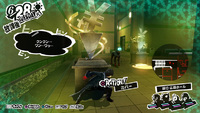|
|

|
PLATFORM
|
PS4
|
BATTLE SYSTEM
|

|
INTERACTION
|

|
ORIGINALITY
|

|
STORY
|

|
MUSIC & SOUND
|

|
VISUALS
|

|
CHALLENGE
|
Adjustable
|
COMPLETION TIME
|
More than 80 Hours
|
|
OVERALL

|
+ Terrific Persona formula with some new twists
+ Style for days
+ Fantastic story, both philosophical and political
+ Great dungeon designs
- Late-game dungeons aren't as good
+ Futaba is best girl
|
Click here for scoring definitions
|
|
|
It's pretty incredible that, thanks to a single game, the Persona franchise has gone from being a relatively obscure offshoot of the more well-known Shin Megami Tensei series to being the most hotly anticipated JRPG in years. Prior to 2006's breakout hit Persona 3, the original PlayStation titles were largely forgotten relics that never received widespread exposure. Persona 5, in contrast, is a game people have been salivating after for nearly a decade, and one only need look at its two predecessors to understand why. With fantastic combat, an addictive combination of dungeon crawling and every-day life simulation, and enough sheer style to carry a dozen games, the modern Persona formula is nearly perfect. With this much hype surrounding it, many wondered if it would even be possible to live up to the expectations. Thankfully, Persona 5 delivers, not just in all the ways one would expect of a Persona game, but in surprising new ways as well.
In the same manner as Persona 3 and 4, Persona 5 begins with the game's protagonist starting life at a new school. An incident in the months prior has left the poor kid railroaded, accused of a crime he didn't commit, and sentenced to probation. As such, he's shipped off to Tokyo to live with an acquaintance of his parents while attending Shujin Academy, the only high school that will take him thanks to his criminal record. Persona 5 immediately takes a rather dramatic turn away from the past two games; rather than being welcomed with open arms, the protagonist is treated as an outcast and a pariah. Rumors swirl around him in the hallways, his teachers look upon him with scorn, and even the man who has been charged with his care seems disinterested and sticks him in an attic room above the coffee shop he runs, warning him to keep out of trouble.
It doesn't take long for the protagonist to make friends with another of the school's outcasts, and together they accidentally stumble into a strange world within people's hearts, where a person's distorted desires can manifest in the shape of a Palace. Guided by a mysterious denizen of this world, a talking cat named Morgana, they form a band known to the world as the Phantom Thieves, with the goal of infiltrating Palaces and stealing the Treasures hidden within, a physical metaphor for a person's heart. By doing so, they force the person to have a change of heart, confessing all their crimes in the process.
 Sneak through Palaces and ambush your foes.
Sneak through Palaces and ambush your foes.
|
|
It should come as no surprise that the story of Persona 5 deals with a number of philosophical and psychological concepts, but it also deals with a number of political ones as well, most notably populism, corruption, and mob mentality. An overarching theme throughout the game is one of justice and social reform, and all the targets of the Phantom Thieves are ones who have manipulated the system and thus avoided the hand of the law. From an abusive gym teacher whose past fame and current coaching successes have led the school authorities to overlook his transgressions to a career criminal who uses blackmail and bribery to control his victims and avoid the police, the targets are always interesting, and the Palaces they harbor allow for some terrific dungeon crawling. Meanwhile, the popularity of the Phantom Thieves with the wider world grows and wanes based on their successes and failures.
One of the standout new features of Persona 5 is its move towards standardized level designs. While the previous two games had randomized dungeons, Persona 5's palaces are all preplanned and terrifically laid out. Taking the form of classic heist tropes — everything from a bank to an Egyptian tomb — the Palaces are designed to allow players to sneak through, ambushing enemies from hiding spots and circumventing traps and security in order to progress and secure a route to the ultimate goal: the Treasure. But there's also Mementos, a massive Palace that exists within the collective unconscious of the entire world, and this dungeon takes on a similar form to Tartarus from Persona 3. Each floor is randomized, and players will be able to venture deeper and deeper as the game progresses. Mementos also houses smaller targets whose hearts the Phantom Thieves will frequently be asked to change. With both the Palaces and Mementos to explore, players will find themselves spending far more time with the dungeon-crawling side of things than in previous games, but thanks to the great level design and steady sense of progression, it never feels dull. Some of the Palace designs in the late stages of the game are notably weaker than the early and mid-game ones, but the story ramps up dramatically around the same time, balancing it out.
The combat system functions in much the same way as the previous Persona games. The protagonist leads a group of four characters into battle against the shadows that dwell within the Palaces. Each character has a single Persona — a manifestation of their true self based on figures from mythology and history — at their disposal, while the protagonist has access to a maximum of twelve at any given time. Each enemy has strengths and weaknesses, and by abusing those weaknesses, players can knock them down, making them susceptible to an all out attack that deals colossal damage. Players familiar with the previous two Persona games, or even the Shin Megami Tensei series as a whole, will have no troubles jumping right in.
Persona 5 does throw something new at fans of recent Persona games: negotiation. While in the past two Persona games, the protagonist acquired new Personas via tarot cards that would appear at the end of battle, Persona 5 takes a page from the broader Shin Megami Tensei series and allows players to negotiate with shadows once they've all been knocked down. Negotiating can be used to acquire money and rare items in addition to new Personas. Negotiation can be an irritatingly esoteric process: each shadow has one of four personality types, which determines what style of response they like the best. Answering their questions appropriately increases the chances that they will join you, but it's often difficult to determine what qualifies as a vague or joking reponse as opposed to a serious or kind one, though it's still better than answering blindly. As players progress, they can also unlock negotiating skills that will improve the chances and in some cases outright guarantee success.
 Packed subway platforms and background chatter help bring Tokyo to life.
Packed subway platforms and background chatter help bring Tokyo to life.
|
|
When not exploring Palaces, the protagonist lives out his day to day life as an ordinary student: going to school, studying for exams, and spending time with friends. Players familiar with the structures of Persona 3 and Persona 4 won't find any surprises here, although the game's tone is something of a departure. Rather than making friendships and building "social links" as in previous games, Persona 5 sees the protagonist striking deals with characters, created Confidants. By spending time and helping Confidants with their problems, they in turn help the protagonist build skills and supplies to support the Phantom Thieves. While functionally identical, Persona 5's Confidants are portrayed as mutually beneficial partnerships as opposed to friendships, though they all develop into them by the time the Confidant rank reaches its maximum.
There are twenty-one Confidants to develop, and although four develop automatically over the course of the story and one isn't bound to time, players will need to manage their days effectively throughout the game. In addition to spending time with their allies, players also must develop their social stats — knowledge, guts, proficiency, kindness, and charm — or else they might not have the social standing to do so. Players also need to make time to explore Palaces and Mementos, and this is where Persona 5 gets particularly nasty about time management. Unlike Persona 3, which would only take up one's evening when exploring a dungeon, or Persona 4, which would only take up the afternoon, Persona 5 takes up the afternoon and leaves the protagonist too exhausted to do anything in the evening. On top of that, exploring Palaces and Mementos needs to be done separately, and the Palaces always require multiple days to complete. Typically speaking they need a minimum of three days: one day to explore the Palace and secure the route to the Treasure, one day to send a calling card, and one day to actually steal the Treasure. In some cases they may only require two days, while in others they may require as many as five. Either way, it's a lot of valuable time.
Thankfully, Persona 5 is also extremely generous about giving players workarounds. For example, many Confidants have the added benefit of significantly boosting a social stat when they rank up, while certain events throughout the game will give players the opportunity to boost more than one Confidant at a time, although they cannot rank up in these cases. On top of that, a few Confidants will provide players with various time-saving skills, the most valuable of which is the ability to go out at night after exploring a Palace or Mementos. Thanks to all these benefits, this reviewer was able to complete all but two Confidants by the end of the game without any guidance, despite the significantly reduced number of available days compared to Persona 3 or 4.
 Traps and security bar your way forward.
Traps and security bar your way forward.
|
|
Persona 5 also offers players an absolutely boggling number of activities to spend their days on, and each of them is peppered with nuggets of character development and lore that might otherwise be missed. Players can read books; play retro video games; eat at fast food restaurants or diners; spend their time making tools, coffee, or curry; try to win prizes at the batting cages; go to see a movie (each of which is accompanied by an utterly hilarious voice-over parody of a classic film); work out at the gym; work at one of four part-time jobs; and more. With all this content to explore, the odds of any player seeing it all is virtually nonexistent, giving the game a lot of replay value as well.
All of this is brought to life thanks to some of the most stylish visuals and audio Atlus has ever produced. Thanks to some gorgeous cel-shading and a fantastic artistic flair, Persona 5's Tokyo is simultaneously realistic and surreal. The cramped, populous city of Tokyo is represented in the real world with crowded subway cars, pedestrian-laden streets, and a swirling cacophany of background speech that players can pick up nuggets of as they explore. Meanwhile, the surreal world of the Palaces and Mementos are inspired by heist films throughout the decades. The Phantom Thieves transform from their school clothes into fanciful masked costumes, and the Palaces are filled with bright, contrasting colors and spectacular, often absurd setpieces. All of this is overlaid by a jazzy soundtrack that distinguishes itself from its predecessor's without losing the youthful, pop-like charm that composer Shoji Meguro has become famous for. The game's main theme, "Wake Up, Get Up, Get Out There," the Treasure-stealing theme, "Life Will Change," and its battle theme, "Last Surprise," highlight Persona 5's heist-inspired themes with their use of rich bass lines and violins.
With Persona 5, Atlus has once again proven that it is the master of the modern JRPG. With terrific style, addictive gameplay, and an engaging, thought-provoking story, Persona 5 not only matches, but often exceeds its predecessors, one of which RPGamer even declared its RPG of the Decade back in 2010. It is an exceptionally long game, with most players likely to expect over one hundred hours for a single playthrough, but the investment is well worth it. Persona 5 is a remarkable game that shouldn't be missed.
Review Archives
|









